
KlicStudio
A video translation and dubbing tool powered by LLMs, offering 99 language translations and one-click full-process deployment. It can generate content optimized for platforms like YouTube,TikTok, and Shorts. AI视频翻译配音工具,99种语言双向翻译,一键部署全流程,可以生成适配抖音,小红书,哔哩哔哩,视频号,TikTok,Youtube Shorts等形态的内容
Stars: 8408
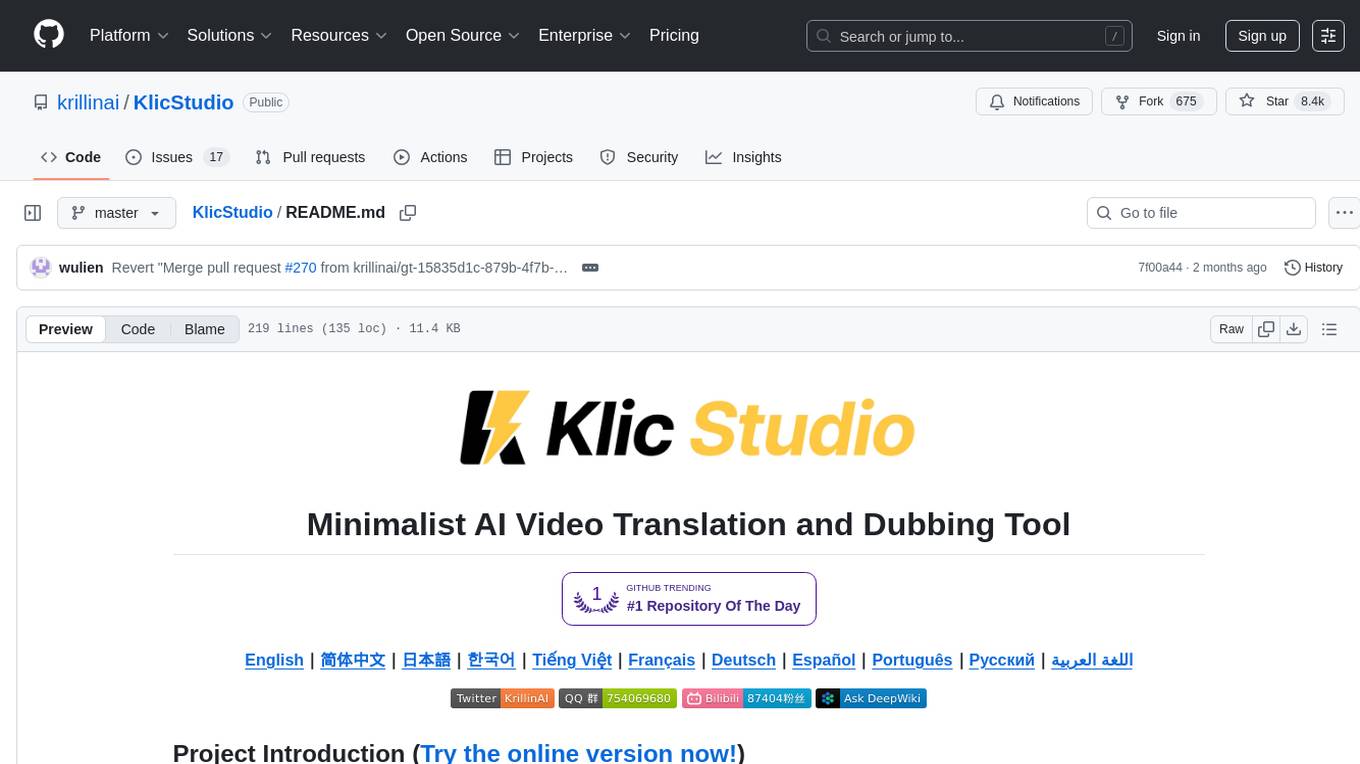
Klic Studio is a versatile audio and video localization and enhancement solution developed by Krillin AI. This minimalist yet powerful tool integrates video translation, dubbing, and voice cloning, supporting both landscape and portrait formats. With an end-to-end workflow, users can transform raw materials into beautifully ready-to-use cross-platform content with just a few clicks. The tool offers features like video acquisition, accurate speech recognition, intelligent segmentation, terminology replacement, professional translation, voice cloning, video composition, and cross-platform support. It also supports various speech recognition services, large language models, and TTS text-to-speech services. Users can easily deploy the tool using Docker and configure it for different tasks like subtitle translation, large model translation, and optional voice services.
README:
Project Introduction (Try the online version now!)
Klic Studio is a versatile audio and video localization and enhancement solution developed by Krillin AI. This minimalist yet powerful tool integrates video translation, dubbing, and voice cloning, supporting both landscape and portrait formats to ensure perfect presentation on all major platforms (Bilibili, Xiaohongshu, Douyin, WeChat Video, Kuaishou, YouTube, TikTok, etc.). With an end-to-end workflow, you can transform raw materials into beautifully ready-to-use cross-platform content with just a few clicks.
🎯 One-click Start: No complex environment configuration required, automatic dependency installation, ready to use immediately, with a new desktop version for easier access!
📥 Video Acquisition: Supports yt-dlp downloads or local file uploads
📜 Accurate Recognition: High-accuracy speech recognition based on Whisper
🧠 Intelligent Segmentation: Subtitle segmentation and alignment using LLM
🔄 Terminology Replacement: One-click replacement of professional vocabulary
🌍 Professional Translation: LLM translation with context to maintain natural semantics
🎙️ Voice Cloning: Offers selected voice tones from CosyVoice or custom voice cloning
🎬 Video Composition: Automatically processes landscape and portrait videos and subtitle layout
💻 Cross-Platform: Supports Windows, Linux, macOS, providing both desktop and server versions
The image below shows the effect of the subtitle file generated after importing a 46-minute local video and executing it with one click, without any manual adjustments. There are no omissions or overlaps, the segmentation is natural, and the translation quality is very high.

All local models in the table below support automatic installation of executable files + model files; you just need to choose, and Klic will prepare everything for you.
| Service Source | Supported Platforms | Model Options | Local/Cloud | Remarks |
|---|---|---|---|---|
| OpenAI Whisper | All Platforms | - | Cloud | Fast speed and good effect |
| FasterWhisper | Windows/Linux |
tiny/medium/large-v2 (recommended medium+) |
Local | Faster speed, no cloud service cost |
| WhisperKit | macOS (M-series only) | large-v2 |
Local | Native optimization for Apple chips |
| WhisperCpp | All Platforms | large-v2 |
Local | Supports all platforms |
| Alibaba Cloud ASR | All Platforms | - | Cloud | Avoids network issues in mainland China |
✅ Compatible with all cloud/local large language model services that comply with OpenAI API specifications, including but not limited to:
- OpenAI
- Gemini
- DeepSeek
- Tongyi Qianwen
- Locally deployed open-source models
- Other API services compatible with OpenAI format
- Alibaba Cloud Voice Service
- OpenAI TTS
Input languages supported: Chinese, English, Japanese, German, Turkish, Korean, Russian, Malay (continuously increasing)
Translation languages supported: English, Chinese, Russian, Spanish, French, and 101 other languages
You can ask questions on the Deepwiki of KlicStudio. It indexes the files in the repository, so you can find answers quickly.
First, download the executable file that matches your device system from the Release, then follow the tutorial below to choose between the desktop version or non-desktop version. Place the software download in an empty folder, as running it will generate some directories, and keeping it in an empty folder will make management easier.
【If it is the desktop version, i.e., the release file with "desktop," see here】 The desktop version is newly released to address the issues of new users struggling to edit configuration files correctly, and there are some bugs that are continuously being updated.
- Double-click the file to start using it (the desktop version also requires configuration within the software)
【If it is the non-desktop version, i.e., the release file without "desktop," see here】 The non-desktop version is the initial version, which has a more complex configuration but is stable in functionality and suitable for server deployment, as it provides a UI in a web format.
- Create a
configfolder within the folder, then create aconfig.tomlfile in theconfigfolder. Copy the contents of theconfig-example.tomlfile from the source code'sconfigdirectory intoconfig.toml, and fill in your configuration information according to the comments. - Double-click or execute the executable file in the terminal to start the service
- Open your browser and enter
http://127.0.0.1:8888to start using it (replace 8888 with the port you specified in the configuration file)
【If it is the desktop version, i.e., the release file with "desktop," see here】 Due to signing issues, the desktop version currently cannot be double-clicked to run or installed via dmg; you need to manually trust the application. The method is as follows:
- Open the terminal in the directory where the executable file (assuming the file name is KlicStudio_1.0.0_desktop_macOS_arm64) is located
- Execute the following commands in order:
sudo xattr -cr ./KlicStudio_1.0.0_desktop_macOS_arm64
sudo chmod +x ./KlicStudio_1.0.0_desktop_macOS_arm64
./KlicStudio_1.0.0_desktop_macOS_arm64
【If it is the non-desktop version, i.e., the release file without "desktop," see here】 This software is not signed, so when running on macOS, after completing the file configuration in the "Basic Steps," you also need to manually trust the application. The method is as follows:
-
Open the terminal in the directory where the executable file (assuming the file name is KlicStudio_1.0.0_macOS_arm64) is located
-
Execute the following commands in order:
sudo xattr -rd com.apple.quarantine ./KlicStudio_1.0.0_macOS_arm64 sudo chmod +x ./KlicStudio_1.0.0_macOS_arm64 ./KlicStudio_1.0.0_macOS_arm64This will start the service
This project supports Docker deployment; please refer to the Docker Deployment Instructions
Based on the provided configuration file, here is the updated "Configuration Help (Must Read)" section for your README file:
The configuration file is divided into several sections: [app], [server], [llm], [transcribe], and [tts]. A task is composed of speech recognition (transcribe) + large model translation (llm) + optional voice services (tts). Understanding this will help you better grasp the configuration file.
Easiest and Quickest Configuration:
For Subtitle Translation Only:
- In the
[transcribe]section, setprovider.nametoopenai. - You will then only need to fill in your OpenAI API key in the
[llm]block to start performing subtitle translations. Theapp.proxy,model, andopenai.base_urlcan be filled in as needed.
Balanced Cost, Speed, and Quality (Using Local Speech Recognition):
- In the
[transcribe]section, setprovider.nametofasterwhisper. - Set
transcribe.fasterwhisper.modeltolarge-v2. - Fill in your large language model configuration in the
[llm]block. - The required local model will be automatically downloaded and installed.
Text-to-Speech (TTS) Configuration (Optional):
- TTS configuration is optional.
- First, set the
provider.nameunder the[tts]section (e.g.,aliyunoropenai). - Then, fill in the corresponding configuration block for the selected provider. For example, if you choose
aliyun, you must fill in the[tts.aliyun]section. - Voice codes in the user interface should be chosen based on the selected provider's documentation.
-
Note: If you plan to use the voice cloning feature, you must select
aliyunas the TTS provider.
Alibaba Cloud Configuration:
- For details on obtaining the necessary
AccessKey,Bucket, andAppKeyfor Alibaba Cloud services, please refer to the Alibaba Cloud Configuration Instructions. The repeated fields for AccessKey, etc., are designed to maintain a clear configuration structure.
Please visit Frequently Asked Questions
- Do not submit useless files, such as .vscode, .idea, etc.; please use .gitignore to filter them out.
- Do not submit config.toml; instead, submit config-example.toml.
- Join our QQ group for questions: 754069680
- Follow our social media accounts, Bilibili, where we share quality content in the AI technology field every day.
For Tasks:
Click tags to check more tools for each tasksFor Jobs:
Alternative AI tools for KlicStudio
Similar Open Source Tools

KlicStudio
Klic Studio is a versatile audio and video localization and enhancement solution developed by Krillin AI. This minimalist yet powerful tool integrates video translation, dubbing, and voice cloning, supporting both landscape and portrait formats. With an end-to-end workflow, users can transform raw materials into beautifully ready-to-use cross-platform content with just a few clicks. The tool offers features like video acquisition, accurate speech recognition, intelligent segmentation, terminology replacement, professional translation, voice cloning, video composition, and cross-platform support. It also supports various speech recognition services, large language models, and TTS text-to-speech services. Users can easily deploy the tool using Docker and configure it for different tasks like subtitle translation, large model translation, and optional voice services.
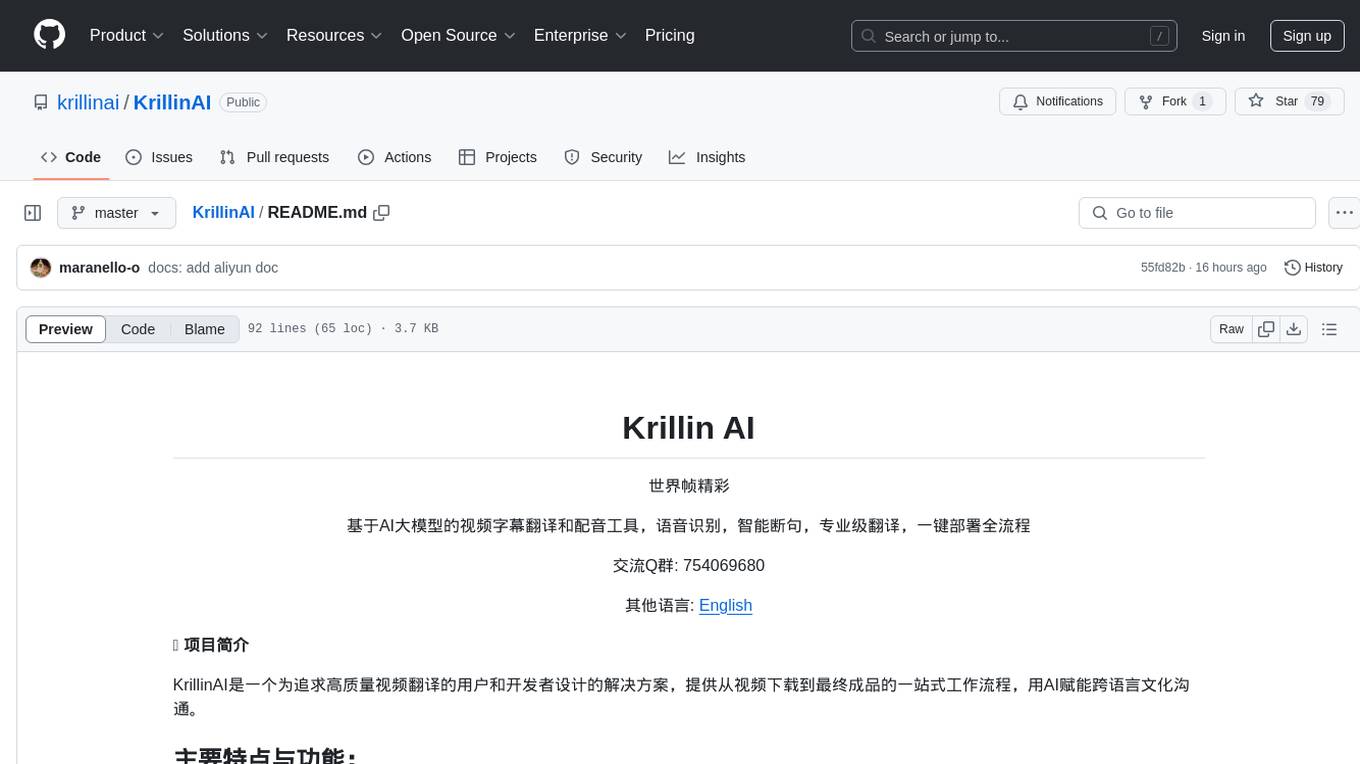
KrillinAI
KrillinAI is a video subtitle translation and dubbing tool based on AI large models, featuring speech recognition, intelligent sentence segmentation, professional translation, and one-click deployment of the entire process. It provides a one-stop workflow from video downloading to the final product, empowering cross-language cultural communication with AI. The tool supports multiple languages for input and translation, integrates features like automatic dependency installation, video downloading from platforms like YouTube and Bilibili, high-speed subtitle recognition, intelligent subtitle segmentation and alignment, custom vocabulary replacement, professional-level translation engine, and diverse external service selection for speech and large model services.

gptme
GPTMe is a tool that allows users to interact with an LLM assistant directly in their terminal in a chat-style interface. The tool provides features for the assistant to run shell commands, execute code, read/write files, and more, making it suitable for various development and terminal-based tasks. It serves as a local alternative to ChatGPT's 'Code Interpreter,' offering flexibility and privacy when using a local model. GPTMe supports code execution, file manipulation, context passing, self-correction, and works with various AI models like GPT-4. It also includes a GitHub Bot for requesting changes and operates entirely in GitHub Actions. In progress features include handling long contexts intelligently, a web UI and API for conversations, web and desktop vision, and a tree-based conversation structure.

OpenAdapt
OpenAdapt is an open-source software adapter between Large Multimodal Models (LMMs) and traditional desktop and web Graphical User Interfaces (GUIs). It aims to automate repetitive GUI workflows by leveraging the power of LMMs. OpenAdapt records user input and screenshots, converts them into tokenized format, and generates synthetic input via transformer model completions. It also analyzes recordings to generate task trees and replay synthetic input to complete tasks. OpenAdapt is model agnostic and generates prompts automatically by learning from human demonstration, ensuring that agents are grounded in existing processes and mitigating hallucinations. It works with all types of desktop GUIs, including virtualized and web, and is open source under the MIT license.
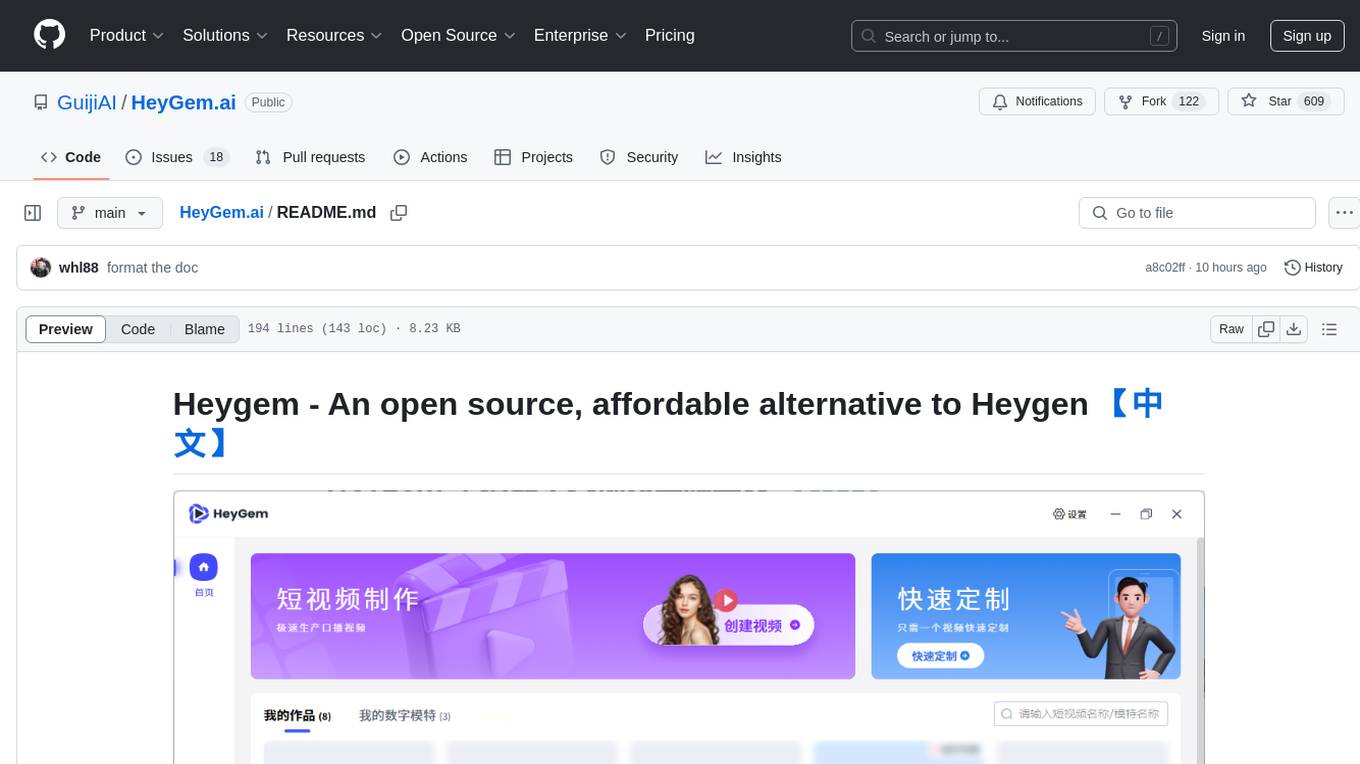
HeyGem.ai
Heygem is an open-source, affordable alternative to Heygen, offering a fully offline video synthesis tool for Windows systems. It enables precise appearance and voice cloning, allowing users to digitalize their image and drive virtual avatars through text and voice for video production. With core features like efficient video synthesis and multi-language support, Heygem ensures a user-friendly experience with fully offline operation and support for multiple models. The tool leverages advanced AI algorithms for voice cloning, automatic speech recognition, and computer vision technology to enhance the virtual avatar's performance and synchronization.
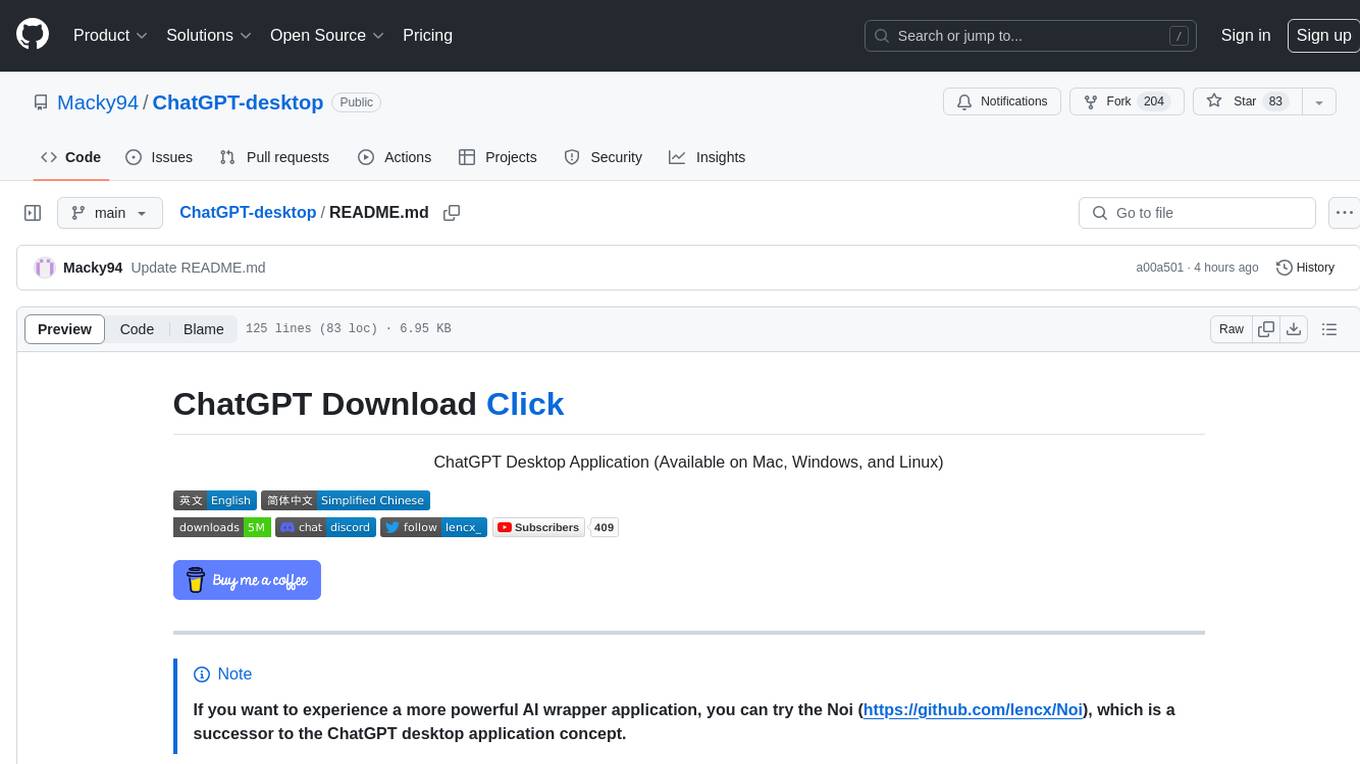
ChatGPT-desktop
ChatGPT Desktop Application is a multi-platform tool that provides a powerful AI wrapper for generating text. It offers features like text-to-speech, exporting chat history in various formats, automatic application upgrades, system tray hover window, support for slash commands, customization of global shortcuts, and pop-up search. The application is built using Tauri and aims to enhance user experience by simplifying text generation tasks. It is available for Mac, Windows, and Linux, and is designed for personal learning and research purposes.
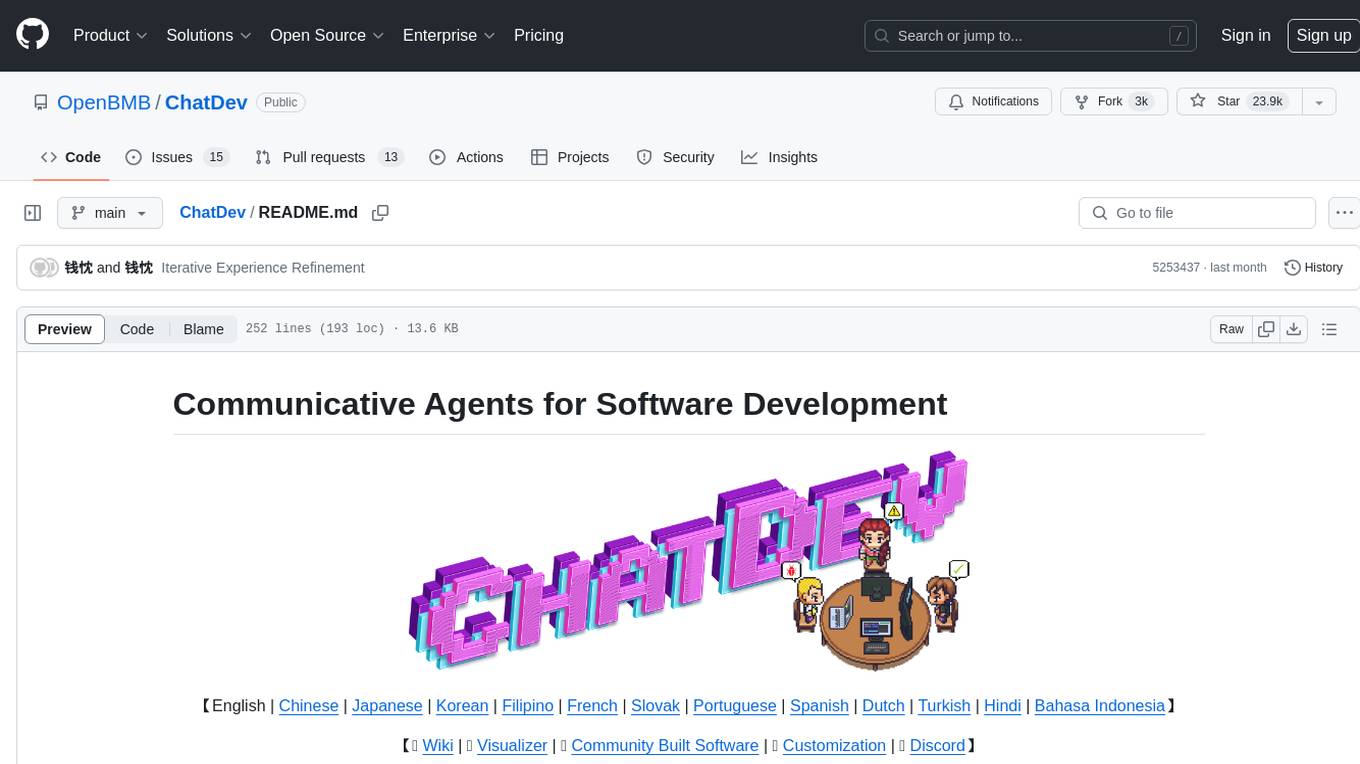
ChatDev
ChatDev is a virtual software company powered by intelligent agents like CEO, CPO, CTO, programmer, reviewer, tester, and art designer. These agents collaborate to revolutionize the digital world through programming. The platform offers an easy-to-use, highly customizable, and extendable framework based on large language models, ideal for studying collective intelligence. ChatDev introduces innovative methods like Iterative Experience Refinement and Experiential Co-Learning to enhance software development efficiency. It supports features like incremental development, Docker integration, Git mode, and Human-Agent-Interaction mode. Users can customize ChatChain, Phase, and Role settings, and share their software creations easily. The project is open-source under the Apache 2.0 License and utilizes data licensed under CC BY-NC 4.0.

llm-answer-engine
This repository contains the code and instructions needed to build a sophisticated answer engine that leverages the capabilities of Groq, Mistral AI's Mixtral, Langchain.JS, Brave Search, Serper API, and OpenAI. Designed to efficiently return sources, answers, images, videos, and follow-up questions based on user queries, this project is an ideal starting point for developers interested in natural language processing and search technologies.
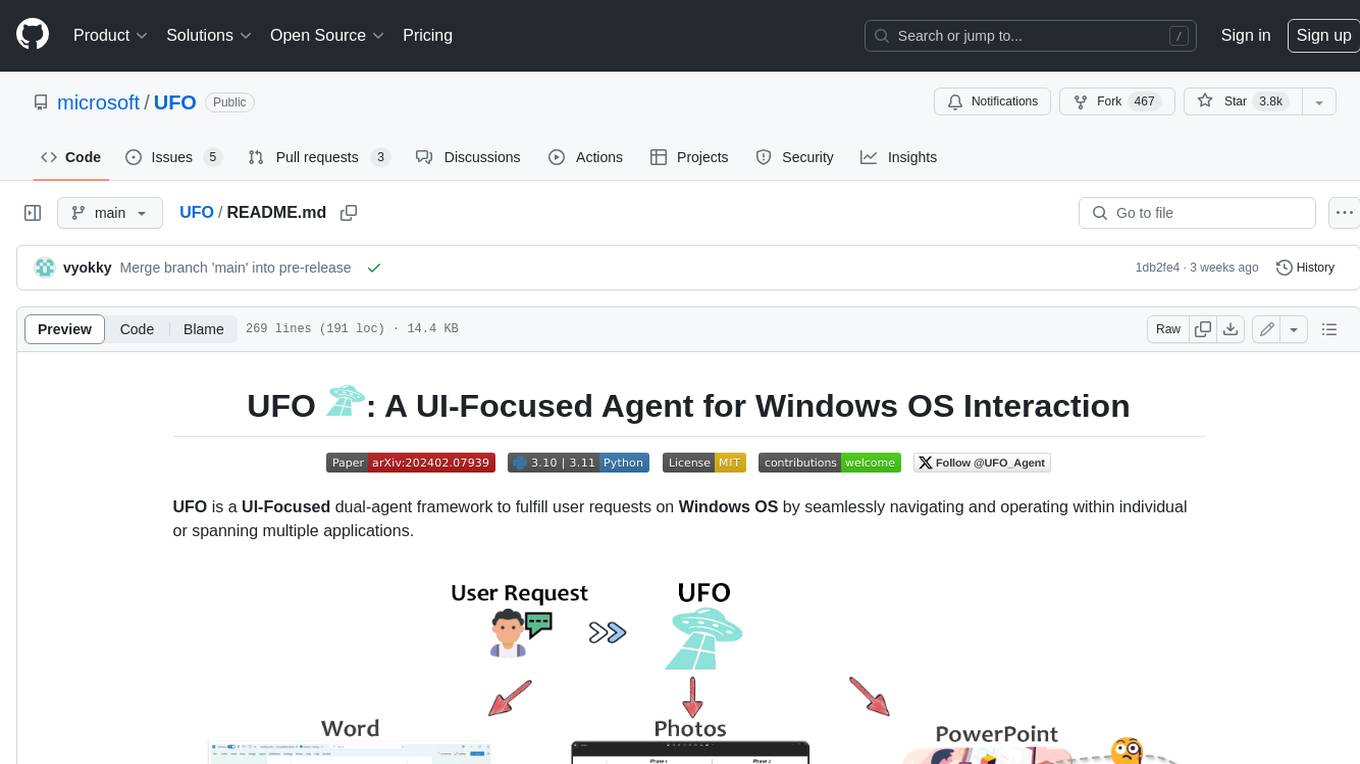
UFO
UFO is a UI-focused dual-agent framework to fulfill user requests on Windows OS by seamlessly navigating and operating within individual or spanning multiple applications.
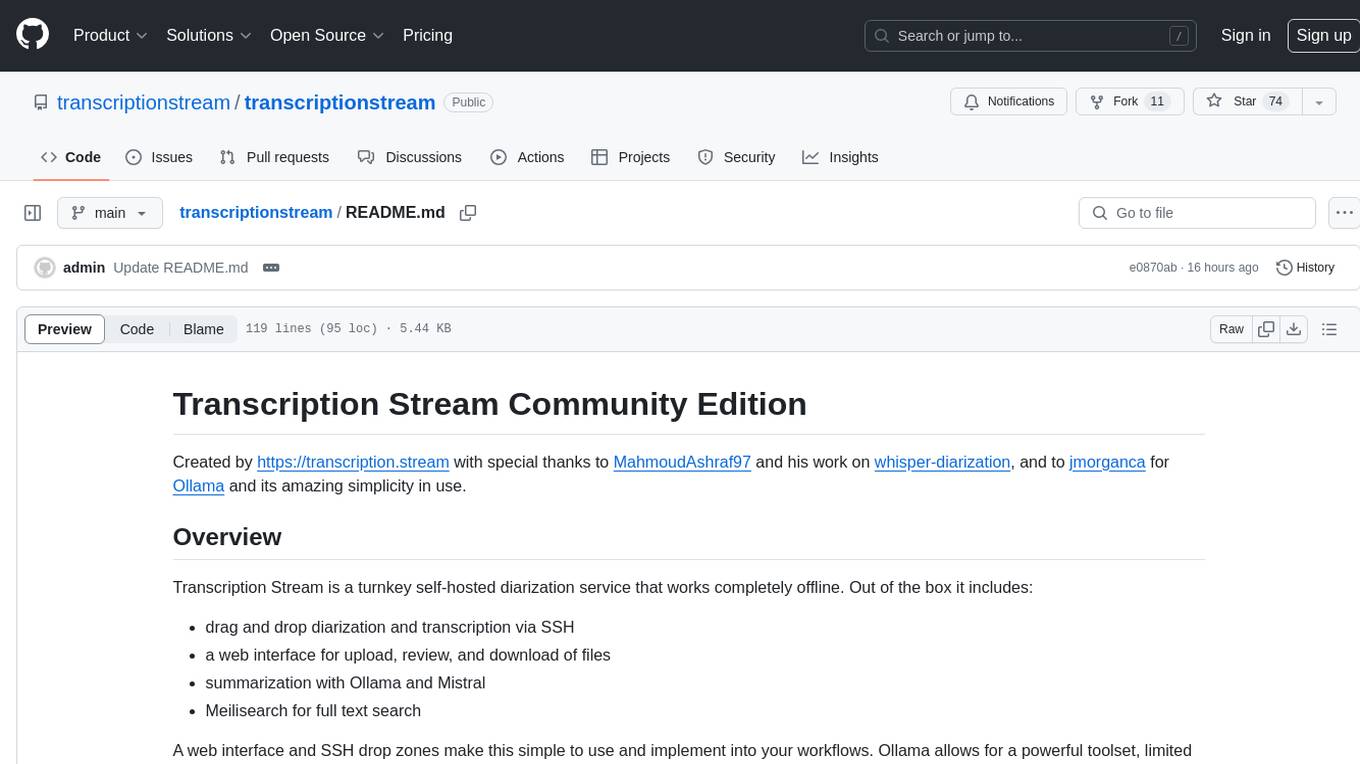
transcriptionstream
Transcription Stream is a self-hosted diarization service that works offline, allowing users to easily transcribe and summarize audio files. It includes a web interface for file management, Ollama for complex operations on transcriptions, and Meilisearch for fast full-text search. Users can upload files via SSH or web interface, with output stored in named folders. The tool requires a NVIDIA GPU and provides various scripts for installation and running. Ports for SSH, HTTP, Ollama, and Meilisearch are specified, along with access details for SSH server and web interface. Customization options and troubleshooting tips are provided in the documentation.
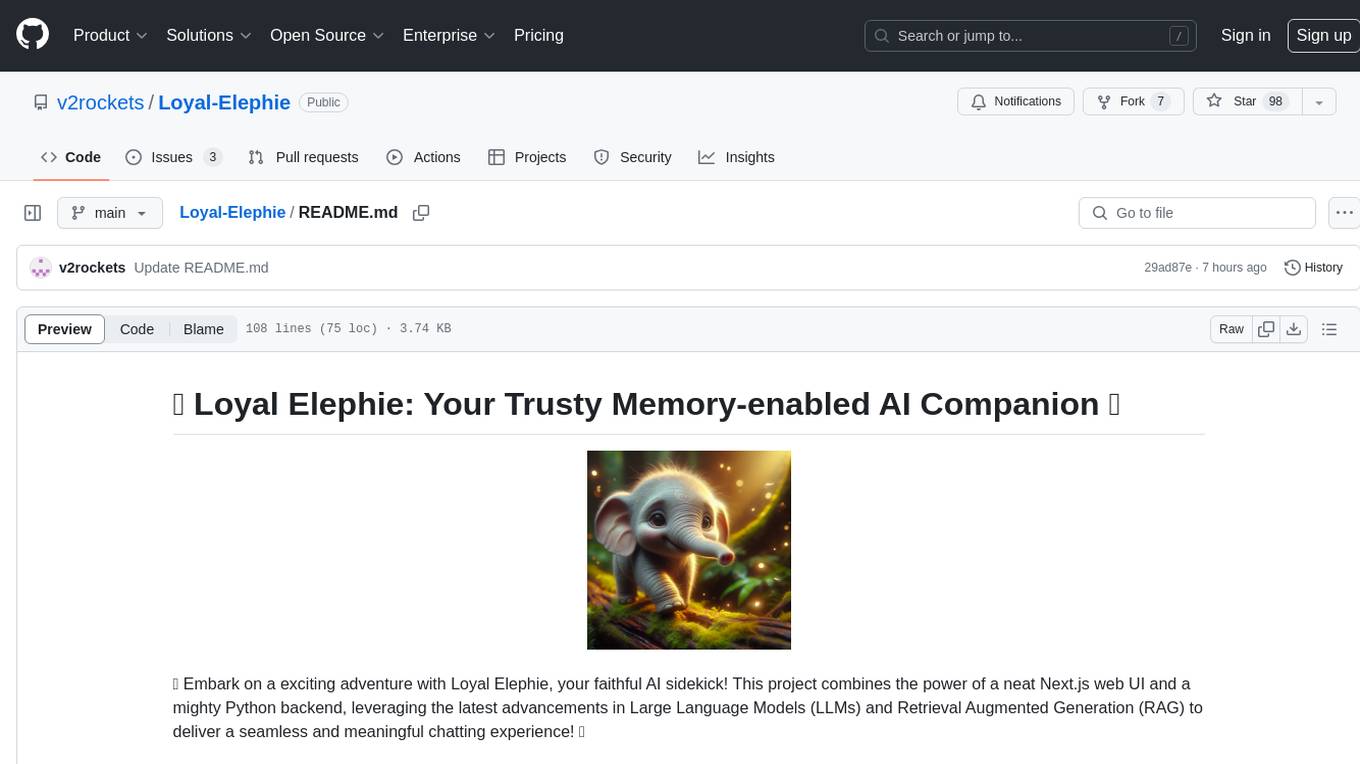
Loyal-Elephie
Embark on an exciting adventure with Loyal Elephie, your faithful AI sidekick! This project combines the power of a neat Next.js web UI and a mighty Python backend, leveraging the latest advancements in Large Language Models (LLMs) and Retrieval Augmented Generation (RAG) to deliver a seamless and meaningful chatting experience. Features include controllable memory, hybrid search, secure web access, streamlined LLM agent, and optional Markdown editor integration. Loyal Elephie supports both open and proprietary LLMs and embeddings serving as OpenAI compatible APIs.
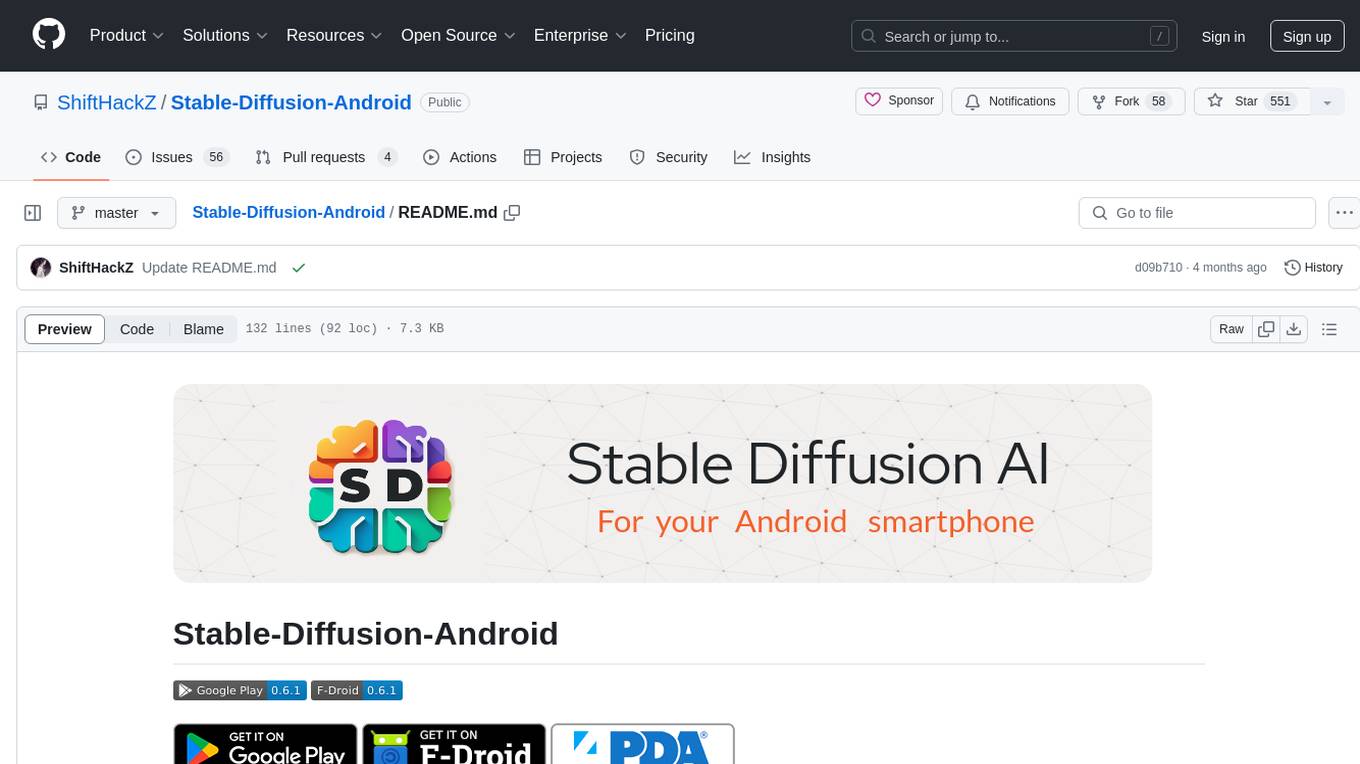
Stable-Diffusion-Android
Stable Diffusion AI is an easy-to-use app for generating images from text or other images. It allows communication with servers powered by various AI technologies like AI Horde, Hugging Face Inference API, OpenAI, StabilityAI, and LocalDiffusion. The app supports Txt2Img and Img2Img modes, positive and negative prompts, dynamic size and sampling methods, unique seed input, and batch image generation. Users can also inpaint images, select faces from gallery or camera, and export images. The app offers settings for server URL, SD Model selection, auto-saving images, and clearing cache.
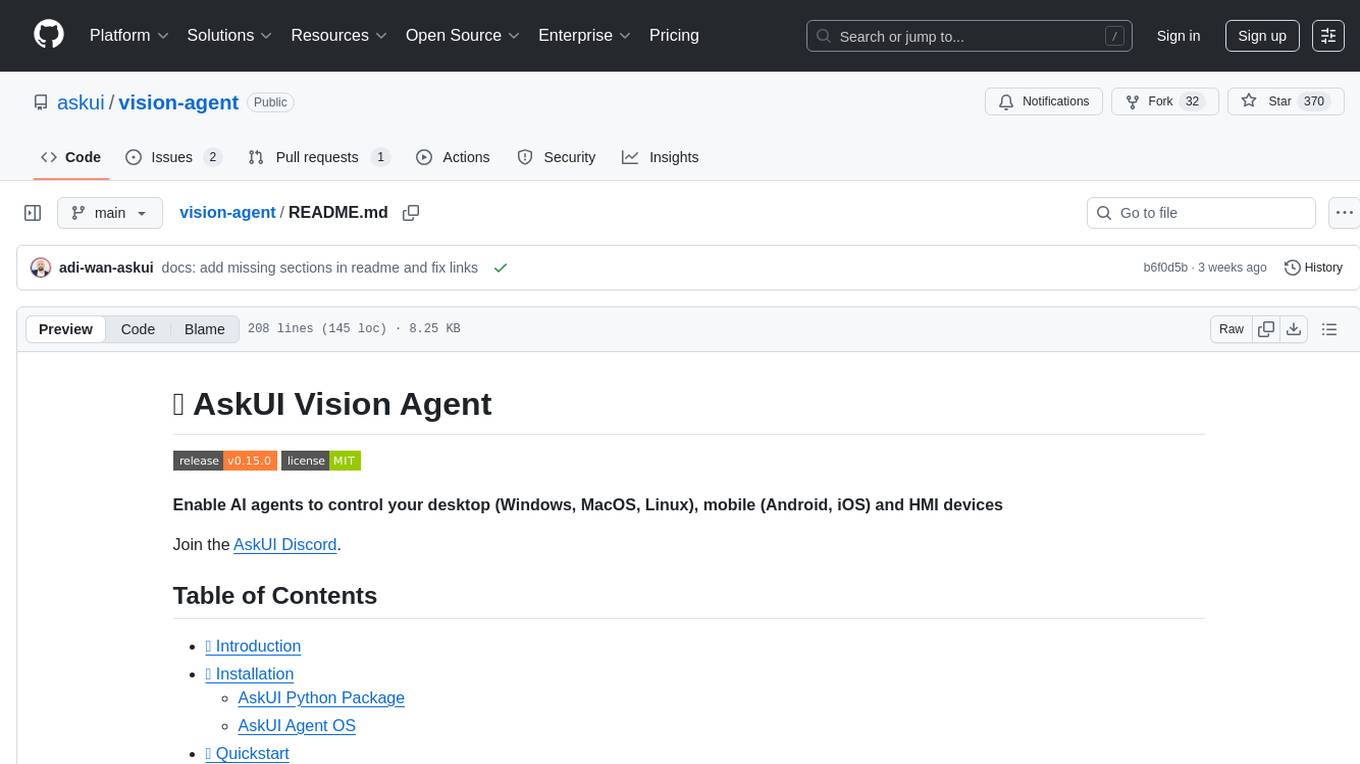
vision-agent
AskUI Vision Agent is a powerful automation framework that enables you and AI agents to control your desktop, mobile, and HMI devices and automate tasks. It supports multiple AI models, multi-platform compatibility, and enterprise-ready features. The tool provides support for Windows, Linux, MacOS, Android, and iOS device automation, single-step UI automation commands, in-background automation on Windows machines, flexible model use, and secure deployment of agents in enterprise environments.
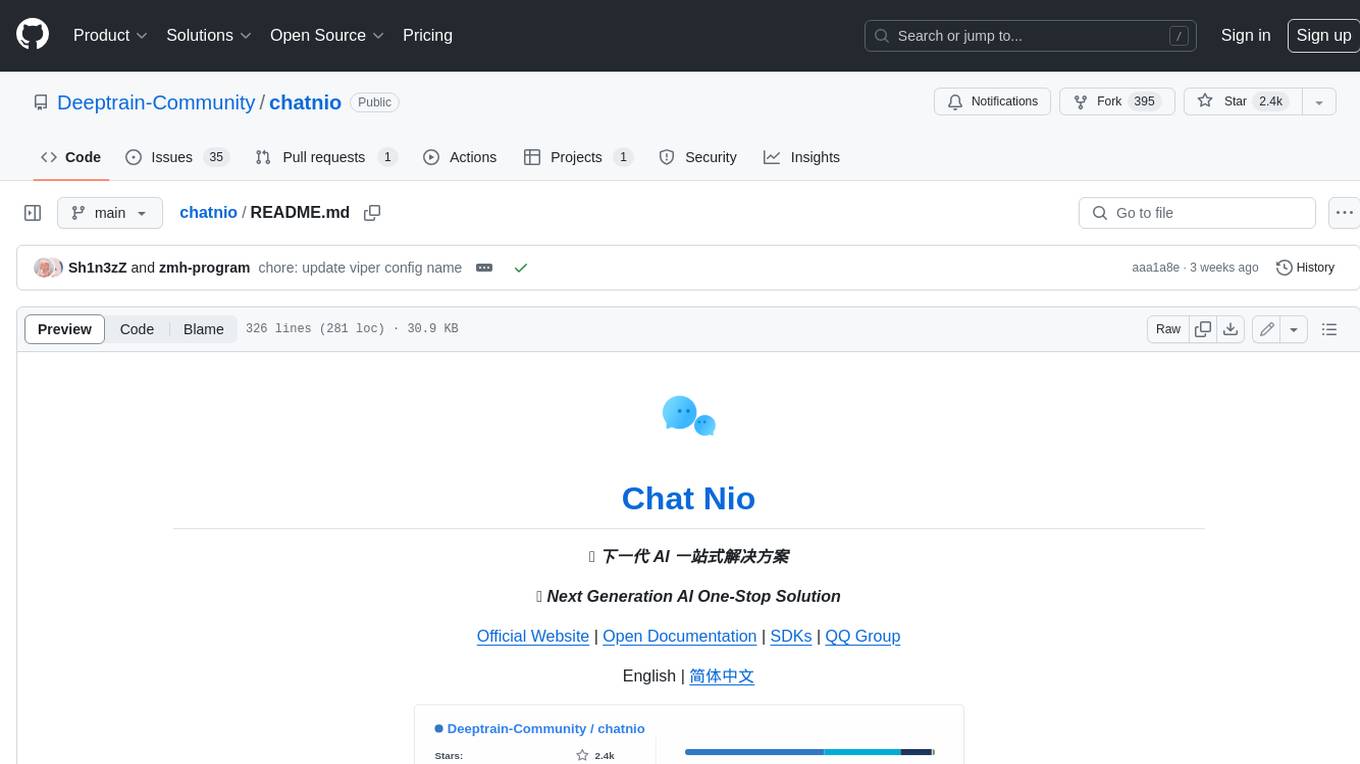
chatnio
Chat Nio is a next-generation AI one-stop solution that provides a rich and user-friendly interface for interacting with various AI models. It offers features such as AI chat conversation, rich format compatibility, markdown support, message menu support, multi-platform adaptation, dialogue memory, full-model file parsing, full-model DuckDuckGo online search, full-screen large text editing, model marketplace, preset support, site announcements, preference settings, internationalization support, and a rich admin system. Chat Nio also boasts a powerful channel management system that utilizes a self-developed channel distribution algorithm, supports multi-channel management, is compatible with multiple formats, allows for custom models, supports channel retries, enables balanced load within the same channel, and provides channel model mapping and user grouping. Additionally, Chat Nio offers forwarding API services that are compatible with multiple formats in the OpenAI universal format and support multiple model compatible layers. It also provides a custom build and install option for highly customizable deployments. Chat Nio is an open-source project licensed under the Apache License 2.0 and welcomes contributions from the community.
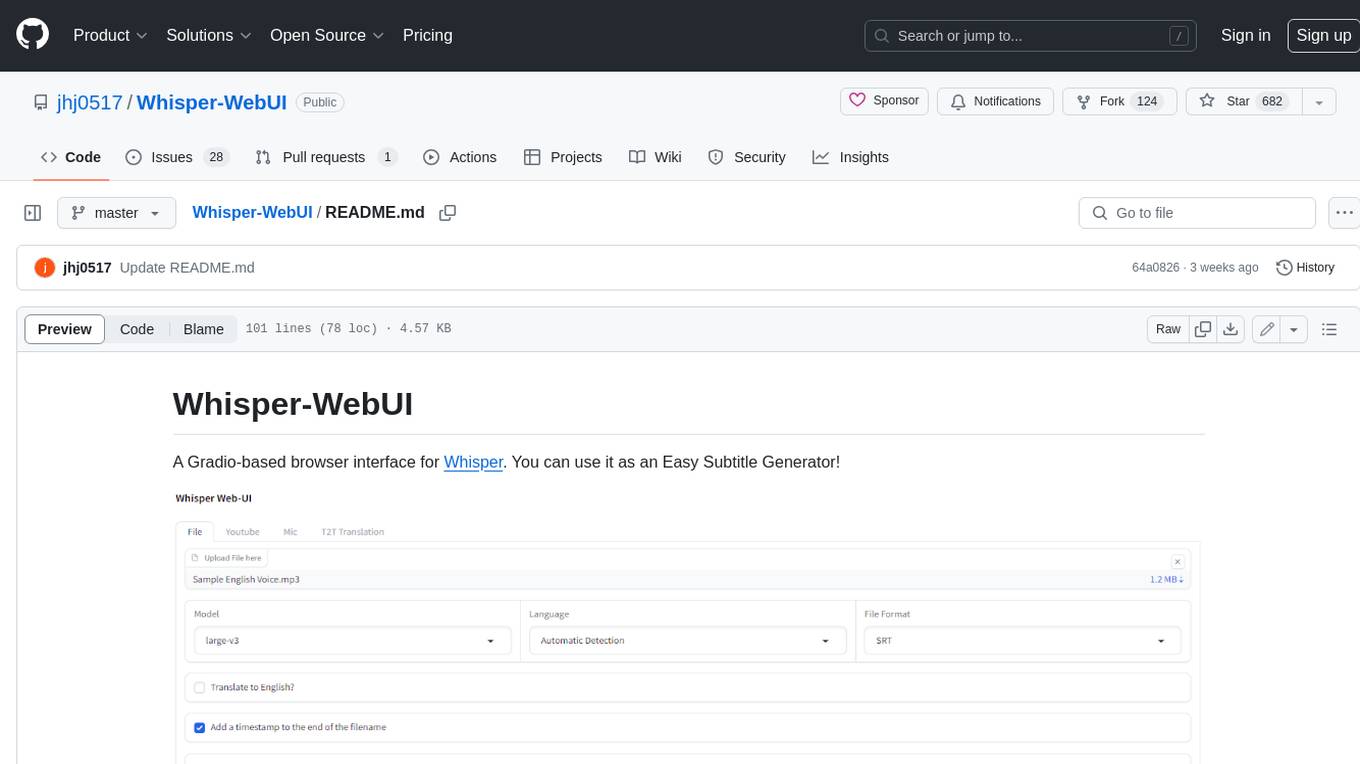
Whisper-WebUI
Whisper-WebUI is a Gradio-based browser interface for Whisper, serving as an Easy Subtitle Generator. It supports generating subtitles from various sources such as files, YouTube, and microphone. The tool also offers speech-to-text and text-to-text translation features, utilizing Facebook NLLB models and DeepL API. Users can translate subtitle files from other languages to English and vice versa. The project integrates faster-whisper for improved VRAM usage and transcription speed, providing efficiency metrics for optimized whisper models. Additionally, users can choose from different Whisper models based on size and language requirements.
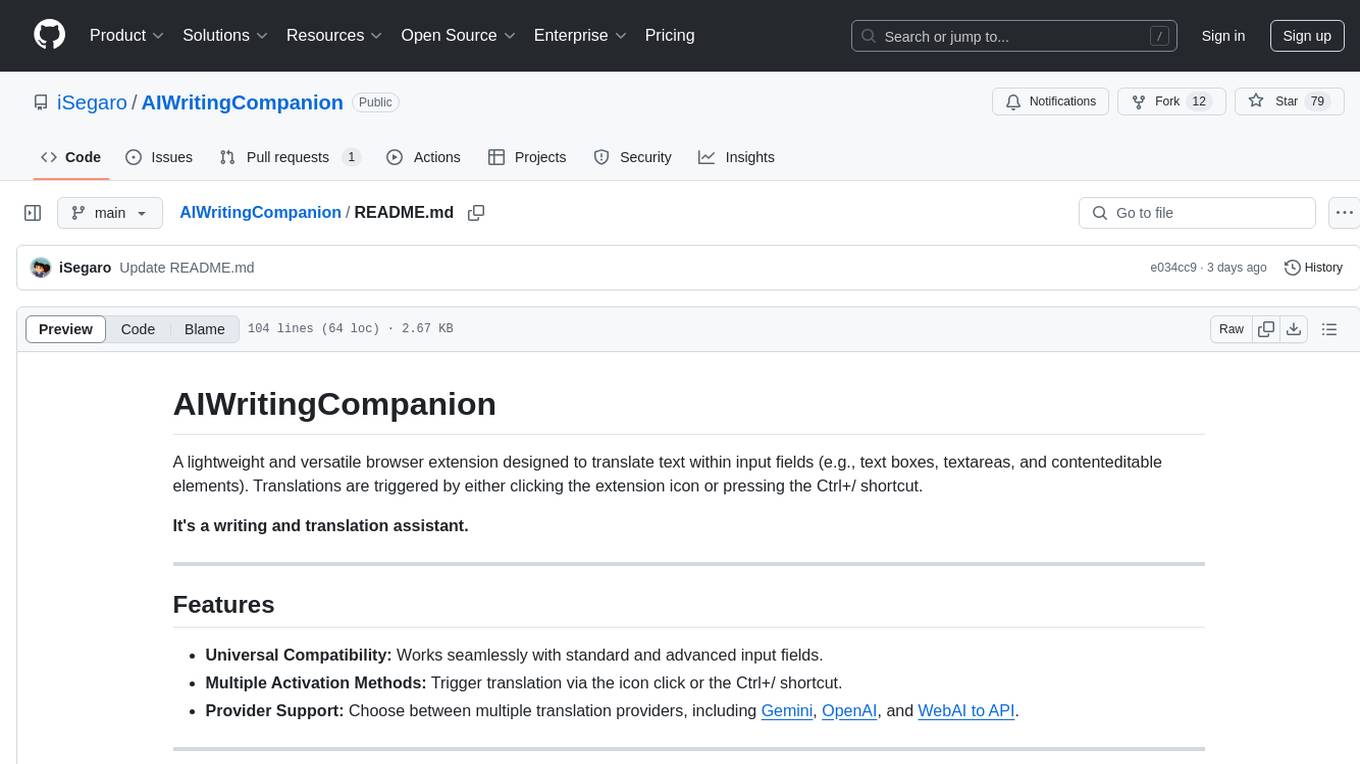
AIWritingCompanion
AIWritingCompanion is a lightweight and versatile browser extension designed to translate text within input fields. It offers universal compatibility, multiple activation methods, and support for various translation providers like Gemini, OpenAI, and WebAI to API. Users can install it via CRX file or Git, set API key, and use it for automatic translation or via shortcut. The tool is suitable for writers, translators, students, researchers, and bloggers. AI keywords include writing assistant, translation tool, browser extension, language translation, and text translator. Users can use it for tasks like translate text, assist in writing, simplify content, check language accuracy, and enhance communication.
For similar tasks
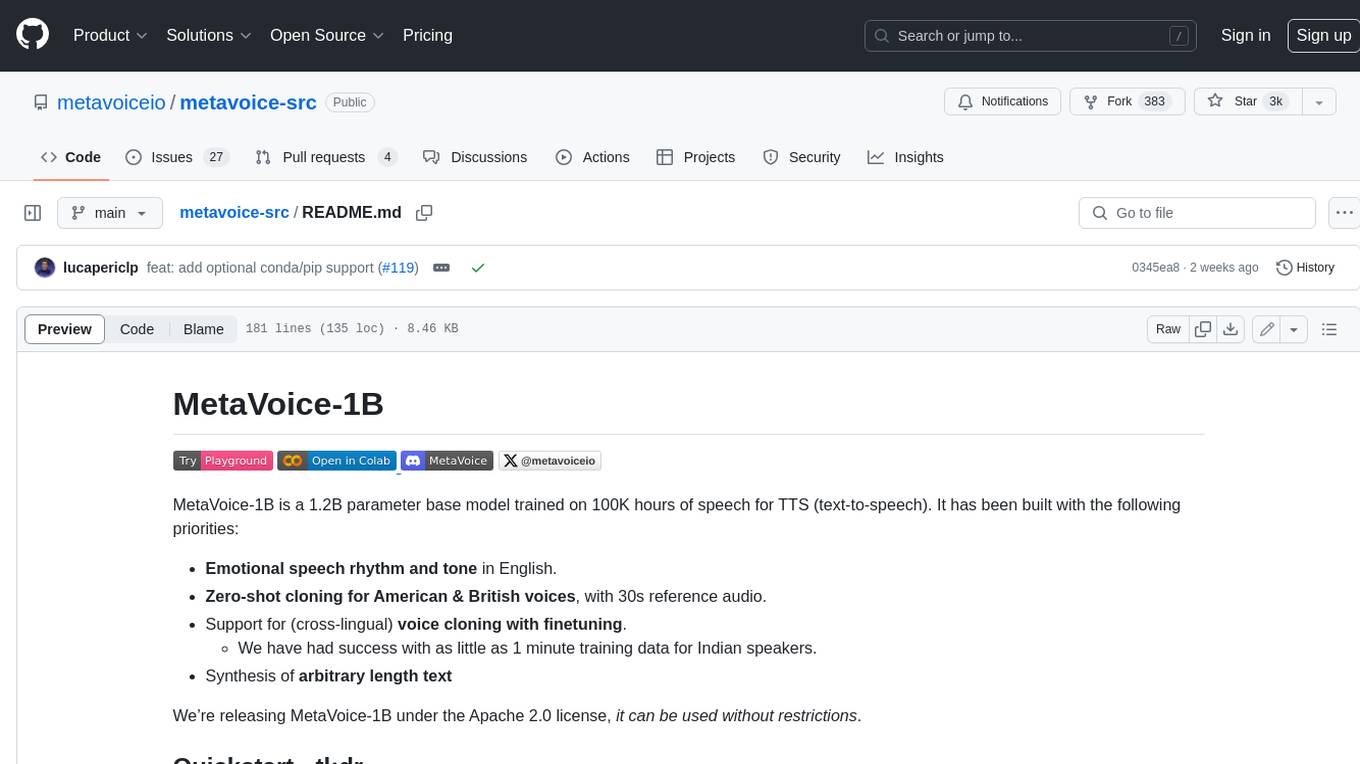
metavoice-src
MetaVoice-1B is a 1.2B parameter base model trained on 100K hours of speech for TTS (text-to-speech). It has been built with the following priorities: * Emotional speech rhythm and tone in English. * Zero-shot cloning for American & British voices, with 30s reference audio. * Support for (cross-lingual) voice cloning with finetuning. * We have had success with as little as 1 minute training data for Indian speakers. * Synthesis of arbitrary length text
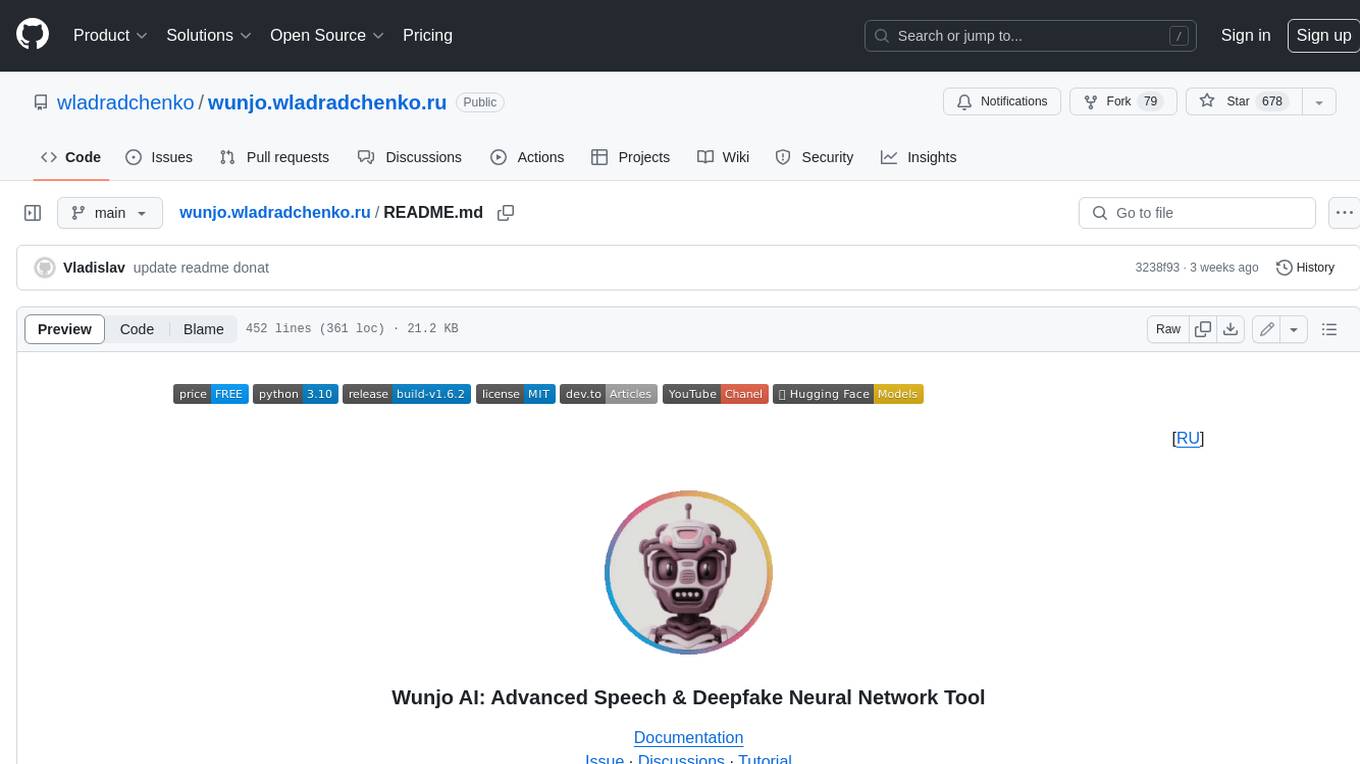
wunjo.wladradchenko.ru
Wunjo AI is a comprehensive tool that empowers users to explore the realm of speech synthesis, deepfake animations, video-to-video transformations, and more. Its user-friendly interface and privacy-first approach make it accessible to both beginners and professionals alike. With Wunjo AI, you can effortlessly convert text into human-like speech, clone voices from audio files, create multi-dialogues with distinct voice profiles, and perform real-time speech recognition. Additionally, you can animate faces using just one photo combined with audio, swap faces in videos, GIFs, and photos, and even remove unwanted objects or enhance the quality of your deepfakes using the AI Retouch Tool. Wunjo AI is an all-in-one solution for your voice and visual AI needs, offering endless possibilities for creativity and expression.
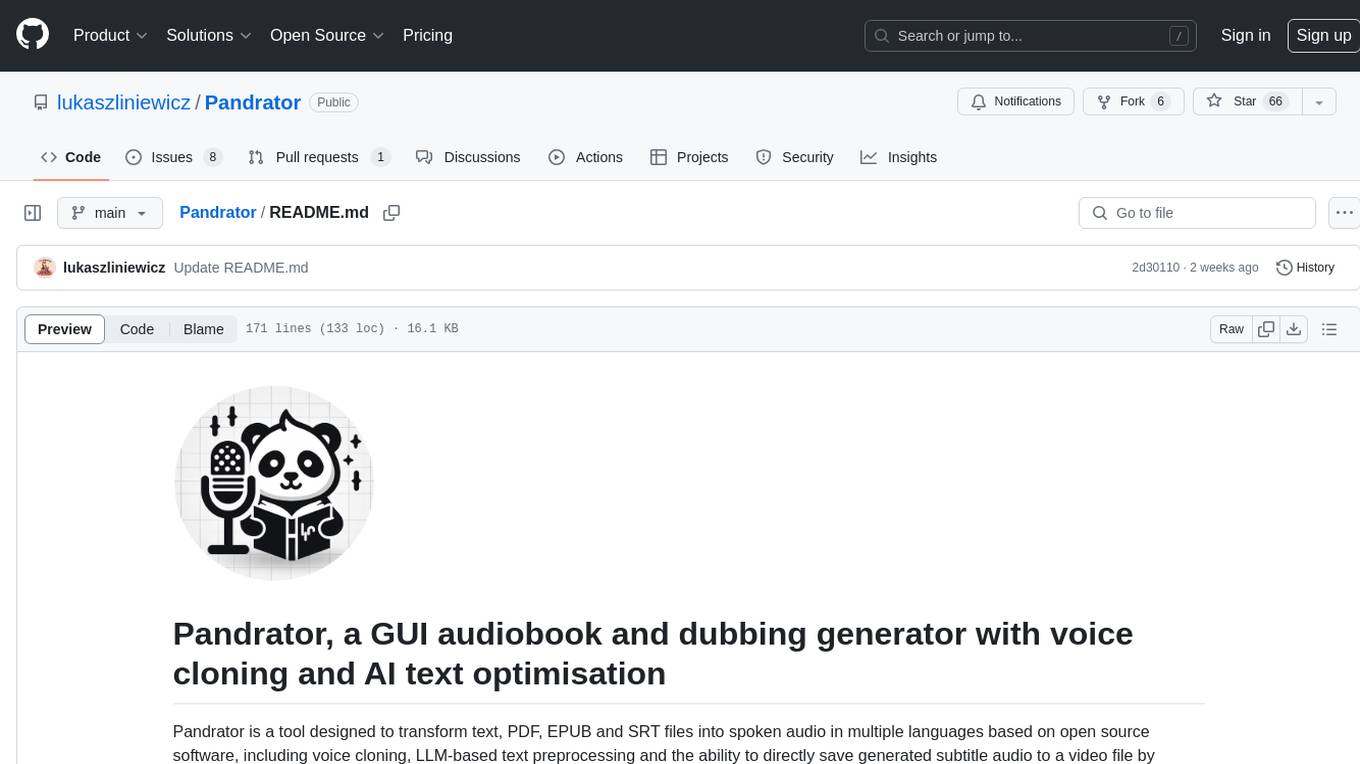
Pandrator
Pandrator is a GUI tool for generating audiobooks and dubbing using voice cloning and AI. It transforms text, PDF, EPUB, and SRT files into spoken audio in multiple languages. It leverages XTTS, Silero, and VoiceCraft models for text-to-speech conversion and voice cloning, with additional features like LLM-based text preprocessing and NISQA for audio quality evaluation. The tool aims to be user-friendly with a one-click installer and a graphical interface.
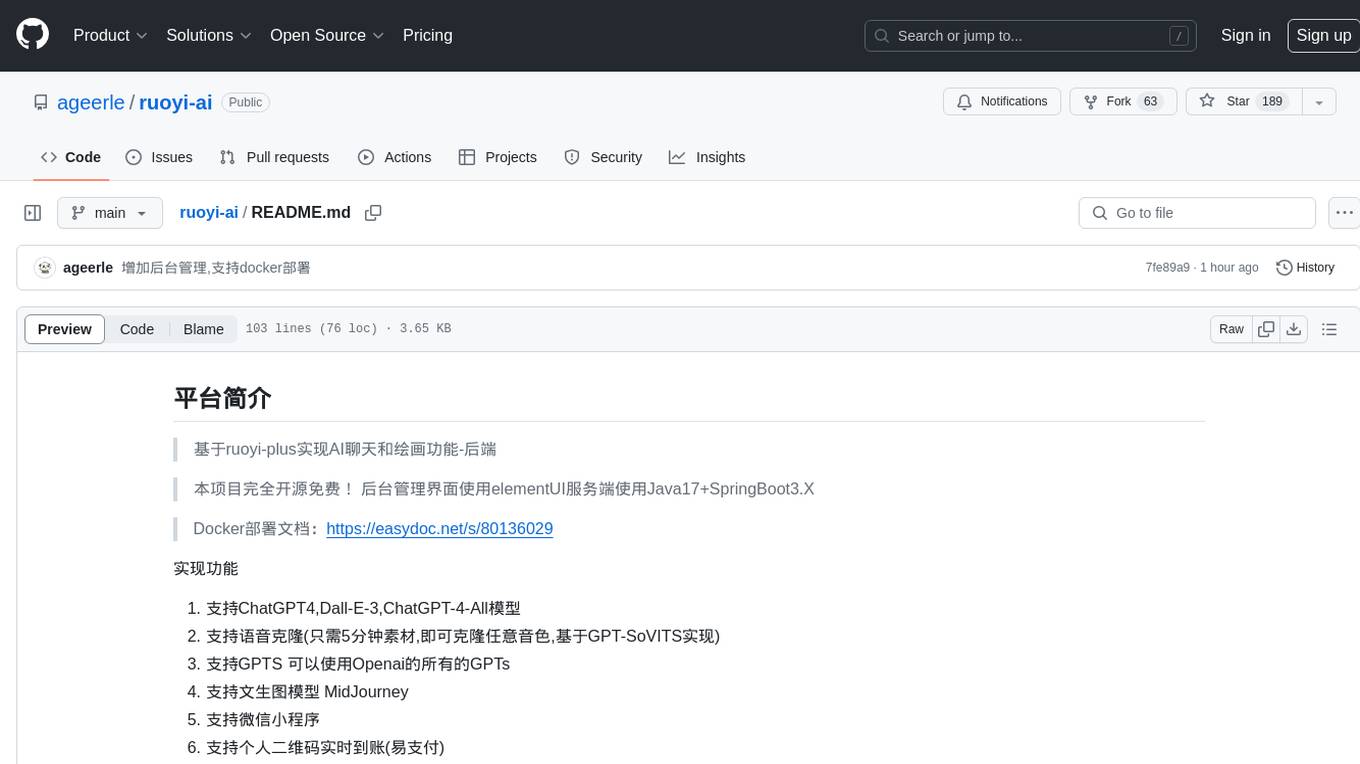
ruoyi-ai
ruoyi-ai is a platform built on top of ruoyi-plus to implement AI chat and drawing functionalities on the backend. The project is completely open source and free. The backend management interface uses elementUI, while the server side is built using Java 17 and SpringBoot 3.X. It supports various AI models such as ChatGPT4, Dall-E-3, ChatGPT-4-All, voice cloning based on GPT-SoVITS, GPTS, and MidJourney. Additionally, it supports WeChat mini programs, personal QR code real-time payments, monitoring and AI auto-reply in live streaming rooms like Douyu and Bilibili, and personal WeChat integration with ChatGPT. The platform also includes features like private knowledge base management and provides various demo interfaces for different platforms such as mobile, web, and PC.
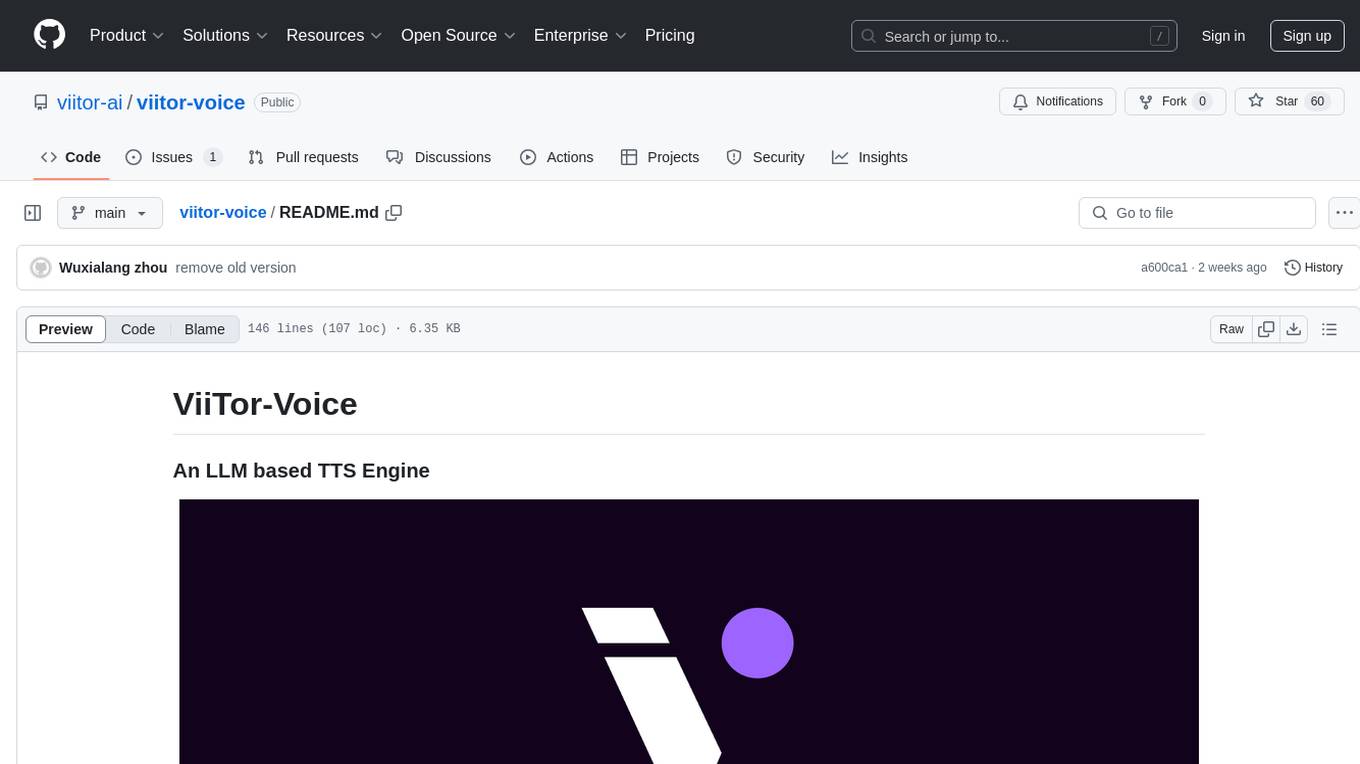
viitor-voice
ViiTor-Voice is an LLM based TTS Engine that offers a lightweight design with 0.5B parameters for efficient deployment on various platforms. It provides real-time streaming output with low latency experience, a rich voice library with over 300 voice options, flexible speech rate adjustment, and zero-shot voice cloning capabilities. The tool supports both Chinese and English languages and is suitable for applications requiring quick response and natural speech fluency.

ebook2audiobook
ebook2audiobook is a CPU/GPU converter tool that converts eBooks to audiobooks with chapters and metadata using tools like Calibre, ffmpeg, XTTSv2, and Fairseq. It supports voice cloning and a wide range of languages. The tool is designed to run on 4GB RAM and provides a new v2.0 Web GUI interface for user-friendly interaction. Users can convert eBooks to text format, split eBooks into chapters, and utilize high-quality text-to-speech functionalities. Supported languages include Arabic, Chinese, English, French, German, Hindi, and many more. The tool can be used for legal, non-DRM eBooks only and should be used responsibly in compliance with applicable laws.

HeyGem.ai
Heygem is an open-source, affordable alternative to Heygen, offering a fully offline video synthesis tool for Windows systems. It enables precise appearance and voice cloning, allowing users to digitalize their image and drive virtual avatars through text and voice for video production. With core features like efficient video synthesis and multi-language support, Heygem ensures a user-friendly experience with fully offline operation and support for multiple models. The tool leverages advanced AI algorithms for voice cloning, automatic speech recognition, and computer vision technology to enhance the virtual avatar's performance and synchronization.

KlicStudio
Klic Studio is a versatile audio and video localization and enhancement solution developed by Krillin AI. This minimalist yet powerful tool integrates video translation, dubbing, and voice cloning, supporting both landscape and portrait formats. With an end-to-end workflow, users can transform raw materials into beautifully ready-to-use cross-platform content with just a few clicks. The tool offers features like video acquisition, accurate speech recognition, intelligent segmentation, terminology replacement, professional translation, voice cloning, video composition, and cross-platform support. It also supports various speech recognition services, large language models, and TTS text-to-speech services. Users can easily deploy the tool using Docker and configure it for different tasks like subtitle translation, large model translation, and optional voice services.
For similar jobs

sweep
Sweep is an AI junior developer that turns bugs and feature requests into code changes. It automatically handles developer experience improvements like adding type hints and improving test coverage.

teams-ai
The Teams AI Library is a software development kit (SDK) that helps developers create bots that can interact with Teams and Microsoft 365 applications. It is built on top of the Bot Framework SDK and simplifies the process of developing bots that interact with Teams' artificial intelligence capabilities. The SDK is available for JavaScript/TypeScript, .NET, and Python.

ai-guide
This guide is dedicated to Large Language Models (LLMs) that you can run on your home computer. It assumes your PC is a lower-end, non-gaming setup.

classifai
Supercharge WordPress Content Workflows and Engagement with Artificial Intelligence. Tap into leading cloud-based services like OpenAI, Microsoft Azure AI, Google Gemini and IBM Watson to augment your WordPress-powered websites. Publish content faster while improving SEO performance and increasing audience engagement. ClassifAI integrates Artificial Intelligence and Machine Learning technologies to lighten your workload and eliminate tedious tasks, giving you more time to create original content that matters.

chatbot-ui
Chatbot UI is an open-source AI chat app that allows users to create and deploy their own AI chatbots. It is easy to use and can be customized to fit any need. Chatbot UI is perfect for businesses, developers, and anyone who wants to create a chatbot.

BricksLLM
BricksLLM is a cloud native AI gateway written in Go. Currently, it provides native support for OpenAI, Anthropic, Azure OpenAI and vLLM. BricksLLM aims to provide enterprise level infrastructure that can power any LLM production use cases. Here are some use cases for BricksLLM: * Set LLM usage limits for users on different pricing tiers * Track LLM usage on a per user and per organization basis * Block or redact requests containing PIIs * Improve LLM reliability with failovers, retries and caching * Distribute API keys with rate limits and cost limits for internal development/production use cases * Distribute API keys with rate limits and cost limits for students

uAgents
uAgents is a Python library developed by Fetch.ai that allows for the creation of autonomous AI agents. These agents can perform various tasks on a schedule or take action on various events. uAgents are easy to create and manage, and they are connected to a fast-growing network of other uAgents. They are also secure, with cryptographically secured messages and wallets.

griptape
Griptape is a modular Python framework for building AI-powered applications that securely connect to your enterprise data and APIs. It offers developers the ability to maintain control and flexibility at every step. Griptape's core components include Structures (Agents, Pipelines, and Workflows), Tasks, Tools, Memory (Conversation Memory, Task Memory, and Meta Memory), Drivers (Prompt and Embedding Drivers, Vector Store Drivers, Image Generation Drivers, Image Query Drivers, SQL Drivers, Web Scraper Drivers, and Conversation Memory Drivers), Engines (Query Engines, Extraction Engines, Summary Engines, Image Generation Engines, and Image Query Engines), and additional components (Rulesets, Loaders, Artifacts, Chunkers, and Tokenizers). Griptape enables developers to create AI-powered applications with ease and efficiency.





